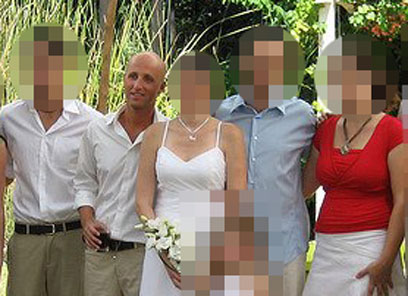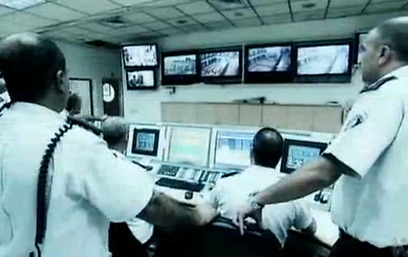
State Prosecutor Moshe Lador said Thursday that the State cannot determine based on evidence in the "Prisoner X" affair that members of the Israel Prison Service or any other outside individuals caused Ben Zygier's death due to reckless behavior and there will therefore be no indictments in the case.
A statement on behalf of the State Prosecutor's Office further noted that materials regarding supervision faults on the day Zygier committed suicide will be relayed to the IPS for further action.
Related stories:
- Report: Zygier planned to pass info to Hezbollah
- 'Prisoner X' report points to IPS failures
- Did Zygier leak Mossad info to ASIO?
The statement said that the IPS will do everything in its power to reduce the number of prisoners' suicides.
Also Thursday, a report drafted by the State Prosecutor's Office which was authorized for publication reveals details from Zygier's last conversation with his wife which may shed light on the prisoner's state of mind on the day he committed suicide at the Ayalon Prison.
The report says that after seeing his wife on the day of his suicide, an intelligence officer noticed he was "visibly upset and crying." It was further noted that he had been given "bad news."

Zygier's wedding
On December 15, 2010 at 11 am Zygier was paid a visit by his wife and daughter who were escorted by an intelligence officer. An hour later, the officer entered the prison cell to accompany the family on their way out and noticed Zygier was upset and in tears. The prisoner asked to deliver a note to his wife but the officer refused. Zygier tore the note in response.
Zygier's wife then asked to reenter her husband's cell in order to calm him down and was granted her request. In his testimony the intelligence officer said that the wife was crying after she stepped out of the cell several minutes later. According to evidence, Zygier had received bad news during the visit.
The officer reported this to his superior who in turn updated the social worker and ordered the guards at the prison's command center to pay special attention to the prisoner.
The social worker testified that she had indeed been told of the visit but that she did not see anything unusual in it as Zygier was often upset after phone calls and visits by his family. She therefore did not issue any special directive on the matter. She further testified that at around 5 pm-6 pm she was told by a guard that Zygier was calm and watching TV.

Image from ABC report
It was further noted that Zygier had been seen by three different psychiatrists on 14 occasions and had met with social workers 57 times during the nine months of his incarceration.
"In all their reports the psychiatrists stated that the deceased had ruled out any suicidal tendencies. Such concerns were not raised in meetings with the social workers either," the State's report said. Nevertheless, the report noted that Zygier had attempted suicide twice during his time in custody.
'No way to save his life'
Lador's statement also quoted the inquest report which said that there was no way to save Zygier's life. "The evidence suggests that the noose around the deceased's neck was particularly tight as the sheet was wet and twisted and it can easily be inferred that the deceased had died within a matter of seconds.
It can therefore be deduced that even if supervision had met the guidelines – i.e. a comprehensive check every thirty minutes – it still cannot be determined whether his life could have been saved."
According to the report, one psychiatrist who met with Zygier a year before his death stated that Zygier had said he tried to kill himself twice in the past and added that he suffered from anxiety. The psychiatrist concluded that "there is no need for special supervision."
However, the report states that Zygier had originally been categorized as a prisoner who requires monitoring and supervision. He had been under the careful watch of health practitioners for possible suicide attempts and the Prison Service strictly observed the directives until the day of Zygier's death.
IPS failures
The report lists a number of Prison Guard personnel found to be responsible for various failures including failure to notice suspicious signs, failure to adhere to supervision directives and failure to repair the broken camera. It was also noted that the social worker failed to recognize the troubled state Zygier was in after the visit.
The State concluded that "an examination of the circumstances of the event leads to the conclusion that had the deceased been supervised from the control room, his entrance into the shower at 6:54 pm would have been detected, his unusual movements observed and staff would have noticed the unusual situation which called for intervention."
The report finally stated that some evidence was found to support the supposition that various IPS failures caused the prisoner's death."
The new report includes details from Zygier's last day. Here is a timeline of the events:
6:05 pm: Lights in cell turned off, prisoner puts sheets on a chair and gets into bed.
6:05 pm: TV set in cell turned on.
6:06 pm: TV set turned off.
6:54 pm: Prisoner gets out of bed, TV set turned on.
6:54 pm: Prisoner enters toilet, room is dark, toilet darker. Movement and man's silhouette spotted in toilet / shower.
8:19 pm: Lights turned on in cell, prisoner's motionless torso seen in shower
The report noted the following faults found in the IPS's conduct on the day of Zygier's death: The command room was left unattended, there was no documented supervision of the prisoner from 5:52 pm, a technical fault prevented one camera from transmitting footage to the command center.
A partial report on the circumstances of Zygier's death was released in February shortly after the Prisoner X affair was exposed.
Aviel Magnezi, Eli Senyor, Naama Cohen Friedman and Raanan Ben-Zur contributed to this report
- Receive Ynetnews updates
directly to your desktop















